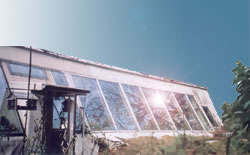|
Tons of emissions and thousands of dollars can be saved with passive
and active solar thermal systems.
 Passive
Solar means the system works without pumps or other equipment.
An example of this system is a south facing window that allows sunlight
to heat an adobe wall in the winter. This simple example can heat the
room not only in the day, but the adobe stores the heat with its thermal
mass, so that the heat can pay back into the room long after the sun goes
down. Passive Solar systems require no maintenance. WE offer consulting
and evaluation of building sites and architectural plans. Passive solar
can be incorporated into the plans for very little extra cost, but once
the building is completed, it is often difficult to retrofit with solar.
Contact us before construction begins, you'll stay warmer, happier, and
save lots of money while helping save the planet. Passive
Solar means the system works without pumps or other equipment.
An example of this system is a south facing window that allows sunlight
to heat an adobe wall in the winter. This simple example can heat the
room not only in the day, but the adobe stores the heat with its thermal
mass, so that the heat can pay back into the room long after the sun goes
down. Passive Solar systems require no maintenance. WE offer consulting
and evaluation of building sites and architectural plans. Passive solar
can be incorporated into the plans for very little extra cost, but once
the building is completed, it is often difficult to retrofit with solar.
Contact us before construction begins, you'll stay warmer, happier, and
save lots of money while helping save the planet.
Active Solar refers to systems that heat
water, glycol, or air in a special solar thermal panel and then pump this
heated fluid into the house. These systems can heat rooms, but are more
commonly used to heat water for showers, dishes, etc. Active Solar systems
require maintenance of the pumps, controls, and plumbing involved. We
have done several years worth of research and development of a solar hot
water system that has its own solar electric system for the pumps and
controls. This system allows people using solar power for their electricity
to use solar for their hot water t00. We currently are not installing
Solar hot water systems, but we can
provide consulting, sell parts, and will happily refer you to others who
specialize in only solar thermal. Link to
solar pumps for floor heating & solar hot water.
We have a current solar hot air experiment
that uses an insulated airspace under a dark colored standard Propanel
roof. While the efficiency of such a system will be significantly lower,
the cost and aesthetic advantages are worthy. Instead of rows of awkward
solar thermal panels mounted on the roof, there is no visible evidence
of a solar thermal system. Fresh air is drawn in at the eaves of the roof,
and then is heated in the 1" space under the dark metal roof. A small
blower then draws the heated air and blows it through insulated ducts
into the north side rooms. This system is not intended to be a stand alone
heating system, instead it works with the south rooms' passive heating
and the traditional floor heating. Instead of trying to solar heat a few
homes 90% (as the Earthships do), we are looking for methods that could
be more easily integrated into millions of homes. If we can reduce the
heating load on a million houses by 20%, we have saved as much fuel as
a 1/4 million Earthships could. While Earthships remain an good choice
for the "truly committed", we're researching for solar heating
methods that will appeal to the general public.
|